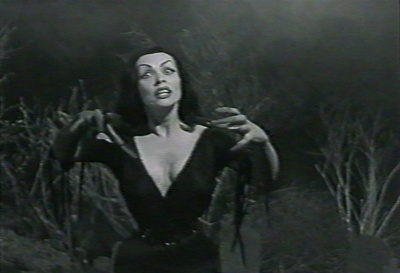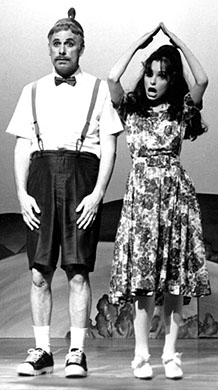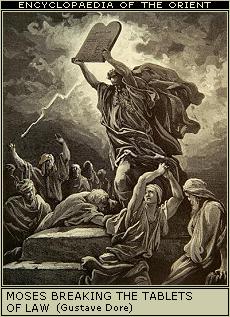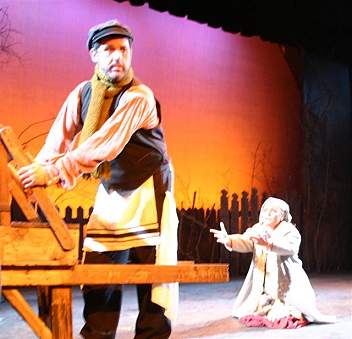

My main theatrical thing is/was writing, but I've trod the boards a few times. My stage resume is short but glamorous. One of my earliest roles,
as mentioned elsewhere, was a giant card. Later I would go on to tackle such meaty challenges as Third Chorus Girl From The Left in
Oklahoma, or, most recently, Green Fairy in Astonishingly Ill-Conceived Production of
Iolanthe at Dyke Drama Collective, which is probably worth a story in itself, sometime. As a girl, I was in a family friend's
pastorela (Nativity play)three years running: once as a dancer, twice as the roller skating angel who comes in to bilingually announce the birth of the baby Jesus, after comically crashing offstage and then limping back on.
But my finest moment onstage, and possibly ever, was in a university production of a little play called
Sapientia. Perhaps you've heard of it. It would be more likely if you happen to be an aficionado of dramatic works by tenth century nuns.
So,
Sapientia, by
Hroswitha Von Gandersheim. One of the grad-student dramaturgs decided this would be a cool thing to put on as a late night cabaret, as it ran well under an hour. What her other criteria were in choosing this, I do not know, although I have my suspicions (more on this later). The original text was a bit...problematic. It
may be the world's only play to contain a ten-minute explanation of a mathematical problem, for a start (as proof of the existence of God. don't ask me how. i was never very good at math).
The plot and characters and dialogue were, well, not nuanced, but then it
was a "morality play." Gist: a wise woman (the eponymous Sapientia) and her three little daughters, Faith, Hope, and Charity are spreading the word of Our Lord Jesus, when news of them is and their subversive new faith is brought to the ears of a Roman emperor, don't remember which. It starts with an "H," I think. Let's call him "Hattie." Hattie has Sapientia hauled in front of him, but, being a reasonable tyrant, he tries at first to talk sense into her, to get her to Come To The Dark (pagan) Side. Sapientia defeats him in a dazzling show of logic (viz math problem), so naturally, Hattie's only recourse is to torture and kill each of her daughters, slowly and horribly, unless they recant their heretical faith. None does, and they are, each in their turn, gloriously and bravely (and bloodily) martyred, followed, at last, by Mother herself. The End.
Now, it seems quite likely that this play was not intended to have been performed per se, seeing as how it called for special effects that would've made Mel Gibson plotz with delight--beheading, disembowling, budding adolescent breasts sliced open only to spurt milk instead of blood (more on this in a moment)--and tenth century convents, as far as I know, were not known for their sophisticated SFX technology. Neither are producers of late night university black box cabaret shows, of course, but this did not daunt our director, who also dabbled (to put it kindly) in design.
So, for instance, she made paper-mache kiddie "heads" for Hattie's henchperson to throw before Sapientia's agonized eyes as proof of the dastardly deed, per script directions; they landed with a hollow "thunk," as I recall, and the one meant to represent mine had blonde curls glued to it, probably culled from Barbie dolls. Faith, the eldest (age twelve, in the script), had her tits cut off. Since she has a line about "Behold, instead of blood, a stream of milk is flowing!," the director decided to have her wear water balloons filled with yep, you guessed it.
My role as Hope, the second daugher (age ten) was to be eviscerated. Since there wasn't an opportunity to go backstage and change costume,--white nightie-like outfits for all of us--her solution was to sew a rather bulgy pocket on the front of my nightie with red velveteen intestines stuffed inside, later to be tweezed out by the henchperson (cackling with Pythonesque glee all the while). Sadly, they had a tendency to peek out of the pocket before it was disemboweling time, which kind of spoiled the, you know, surprise.
Now by this point of course you're saying, "oh, that sounds like brilliant camp! of COURSE the director meant for it to be funny!" And she did, she did. Mostly. I mean, she did have a good sense of humor, and there
was that one rehearsal where Faith's water-balloon tit was tied too tightly and when they went to "slice" it the liquid kind of
arced across the stage in best money-shot fashion, and after the director finished rolling around on the floor she said, rather regretfully, "no, no, that's
too funny, we can't use that." Which to me suggests, in retrospect, that yes, she
did want people to laugh...but if it was "too funny," then there wouldn't be any chance of it being taken seriously as a piece of historical interest, which I do think she kind of wanted to happen. Too.
To this end, she'd devised some odd and rather elaborate conceits. For instance, she'd decided that there should be a frame device showing that this is a play being put on by nuns, for nuns, in a convent. Okay. So it's an all female cast, all right; the emperor is a munchkin of a girl about half the size of the chick playing Charity, the adorable eight-year old, but it's okay: it's a play within a play! It all makes sense now! To further establish this, the director had us start by pantomiming a "evening in the life of" before actually starting
Sapientia. This meant having us enter by solemnly filing in to the accompaniment of some kind of medieval chant (very pretty), sitting down, and eating a meal, which turned out to be cold rice in wooden bowls. In total silence. And full house lights. Then the head nun/emperor would stand up, clap her hands peremptorily, and this would signal "Let's Put On A Passion Play!"
So, since this
is a late night cabaret in a tiny forty seat black box, what this means is that we're sitting mere inches away from our friends and classmates and (God help me) relatives, all merrily passing beer and wine from hand to hand and already laughing their asses off, facing them head on without even a shadow to hide in or a saving line of dialogue, trying to eat cold rice, while the tension builds...and builds...and builds. And let me tell you, if you don't think trying to do this without cracking helplessly the fuck up is an acting challenge the likes of which would stump Meryl Streep, you are wrong, wrong, WRONG. From there on, it only got worse.
Because, you see, in addition to the Charles Ludlam level of props, dialogue, acting, etc., there were a number of additional Ed Woodian factors which weren't intended to happen at all. Like: the stage manager left the backstage phone off the hook one night, so that just as my (first of several) tearful "goodbye, dear Mother, we shall be reunited in Heaven" speech was reaching its impassioned climax--*riiiiing.* There were music cues that didn't go off, light cues that were forgotten (as in, just when the beheading ax was coming down), flubbed lines, dropped torture implements--we were collossally klutzy, collectively, and none of us real actors, to boot.
But the gaffe I still remember most fondly, probably because it resulted in the only standing ovation I have ever gotten in my life, was this:
After I had been degutted, the director decided that it would be cool and maybe even kind of moving to have me give my deathbed speech from the electrics room, which was behind a glass window at the far end of the theatre. So Cardinal Fang-ette would drag my emptied carcass upstage, whereupon my earnest little face was to appear at the window, Sappy would come and press her hands to the glass, and I would have my
swan song...then, blackout.
Unfortunately, the acoustics weren't great, so I had to shout to make myself heard. That was with the door open. But the henchperson
would keep forgetting, and, unable to resist the sheer drama of the "slam" noise,
shut the door, on opening night.
The actor playing Sappy was of course facing away from the audience, so she didn't even pretend to not be laughing, that bitch. Me, I simply didn't realize, until afterward: once the door was shut, no one could hear
anything I said. So there I was, overemoting my little heart out...and looking like a cross between Theda Bara's thallidomide cousin and a guppy. What the hell: applause is applause.
It was sheer love, of course. It really couldn't have been otherwise.








